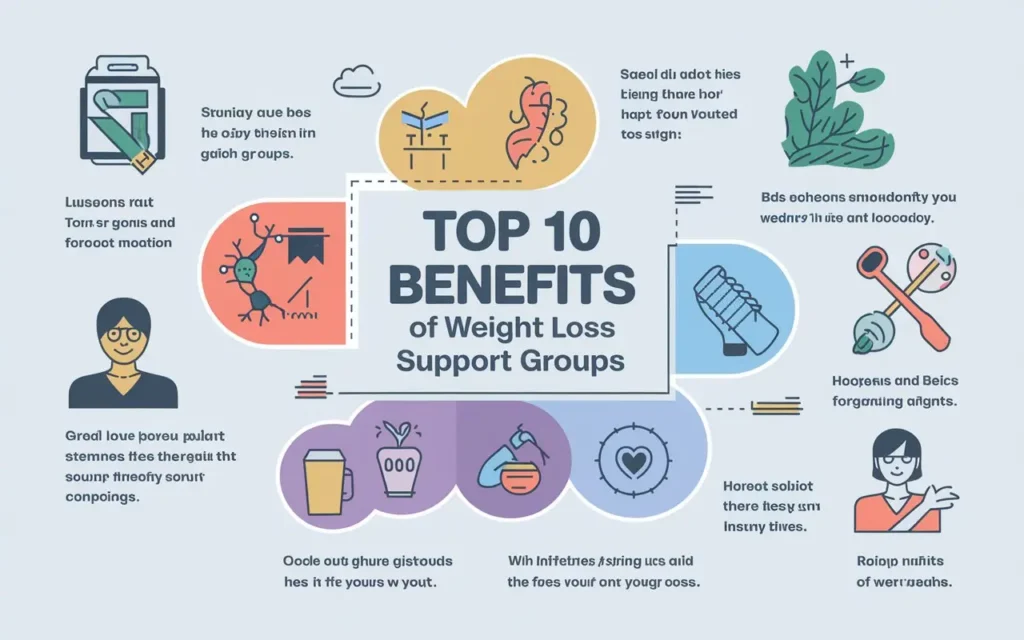Weight Loss Surgery Support Groups: Your Comprehensive Guide
Introduction to Weight Loss Surgery Support Groups
Weight loss surgery support groups play a crucial role in the journey of individuals undergoing bariatric procedures. These groups offer a community of peers who understand the unique challenges and triumphs associated with weight loss surgery.
In this guide, we will delve into the various aspects of weight loss surgery support groups, highlighting their benefits, types, and how to choose the right one for your needs.
Understanding Weight Loss Surgery
Weight loss surgery, also known as bariatric surgery, encompasses a variety of procedures designed to help individuals lose significant weight. Common types include gastric bypass, sleeve gastrectomy, and adjustable gastric banding. Each procedure has its own set of benefits and potential risks, making the support from a group setting invaluable.
The Importance of Support
Undergoing weight loss surgery is not just a physical transformation but also an emotional and psychological journey. Support groups provide the necessary emotional backing, helping individuals navigate the ups and downs of their weight loss journey.
Benefits of Joining Weight Loss Surgery Support Groups

Weight loss surgery support groups provide numerous benefits that can significantly enhance your post-surgery experience. From emotional support to practical advice, these groups are invaluable resources.
Emotional Support
Connecting with others who share similar experiences can alleviate feelings of isolation and provide a sense of belonging. Knowing that others understand your struggles and triumphs can be incredibly comforting.
Accountability
Regular meetings encourage you to stay committed to your weight loss goals and maintain healthy habits. Accountability partners within the group can help you stay on track and motivated.
Information Sharing
Support groups are excellent platforms for exchanging tips, strategies, and resources related to weight loss and maintenance. Members often share valuable insights about diet, exercise, and lifestyle changes that have worked for them.
Motivation
Hearing success stories and sharing your own progress can boost your motivation and reinforce your commitment. Celebrating milestones together fosters a positive and encouraging environment.
Professional Guidance
Many support groups are facilitated by healthcare professionals who provide expert advice and answer questions. This ensures that the information shared is accurate and beneficial.
Long-Term Success
Continuous support from the group can help you maintain your weight loss achievements in the long term. The shared experiences and collective wisdom of the group contribute to sustained success.
Types of Weight Loss Surgery Support Groups

Weight loss surgery support groups come in various forms, each catering to different preferences and needs. Understanding the types available can help you choose the best fit for your journey.
In-Person Support Groups
These are traditional face-to-face meetings where members gather to share their experiences and support each other. In-person groups often foster a strong sense of community and personal connection.
Online Support Groups
Virtual groups offer flexibility and accessibility, allowing members to connect from anywhere with an internet connection. Online support groups can include forums, video calls, and chat rooms, making them ideal for those with busy schedules or limited local options.
Peer-Led Groups
Led by individuals who have undergone weight loss surgery themselves, these groups emphasize shared experiences and mutual support. Peer-led groups can provide relatable insights and empathetic understanding.
Professional-Led Groups
Facilitated by healthcare professionals, these groups provide expert guidance alongside peer support. Professional-led groups can offer structured programs and reliable information based on medical expertise.
Specialized Support Groups
Catered to specific demographics or needs, such as support for teenagers, men, or individuals with particular health conditions. Specialized groups address unique challenges and provide tailored support for their members.
Hybrid Support Groups
Combining both in-person and online elements, hybrid support groups offer the benefits of face-to-face interaction while maintaining the flexibility of virtual meetings. This format accommodates diverse preferences and schedules.
How to Find the Right Weight Loss Surgery Support Group
Weight loss surgery support groups vary in their focus, structure, and membership. Finding the right group is essential for maximizing the benefits you receive.
Assess Your Needs
Consider what you are looking for in a support group, such as emotional support, information sharing, or professional guidance. Understanding your priorities will help you select a group that aligns with your goals.
Research Local and National Groups
Start by searching for local support groups in your area and explore national organizations that offer support group options. Local groups provide face-to-face interaction, while national groups may offer more diverse perspectives.
Evaluate Group Structure
Determine whether you prefer a peer-led or professional-led group, as well as the meeting frequency and format. Consider factors like meeting times, location, and the overall structure of the group to ensure it fits your schedule and preferences.
Seek Recommendations
Ask your healthcare provider, bariatric surgeon, or fellow patients for recommendations on reputable support groups. Personal referrals can lead you to trustworthy and effective groups.
Attend a Meeting
Participate in a session to get a feel for the group’s dynamics and determine if it aligns with your comfort and needs. Attending a meeting can help you assess whether the group is a good fit for you.
Consider Accessibility
Ensure that the support group is accessible in terms of location, timing, and any special requirements you may have. Accessibility is crucial for consistent participation and engagement.
Check for Inclusivity
Look for groups that welcome individuals from diverse backgrounds and cater to different needs. An inclusive environment fosters a supportive and respectful community.
Online Weight Loss Surgery Support Groups

Weight loss surgery support groups have embraced the digital age, offering online platforms that provide flexibility and accessibility for members.
Benefits of Online Support Groups
- Accessibility from Anywhere: Participate from the comfort of your home or while traveling.
- Flexible Meeting Times: Access recordings or participate in live sessions at your convenience.
- Anonymity and Privacy: Engage without the pressure of face-to-face interactions.
- Variety of Communication Tools: Utilize forums, video calls, chat rooms, and social media platforms to connect.
- Global Community: Connect with individuals from diverse backgrounds and locations.
Popular Online Platforms
- American Society for Bariatric Surgery
- Facebook Bariatric Support Groups
- My Weight Loss Team
- Weight Watchers Online Community
- Reddit Bariatric Surgery Community
Tips for Participating in Online Groups
- Set Aside Dedicated Time: Allocate specific times for engaging with the group to maintain consistency.
- Engage Actively: Share your experiences, ask questions, and provide support to others.
- Respect Group Guidelines: Adhere to the rules and maintain confidentiality within the group.
- Utilize Available Resources: Take advantage of shared materials, webinars, and expert sessions offered by the group.
- Stay Open-Minded: Be receptive to different perspectives and approaches shared by group members.
Choosing the Right Online Platform
Select a platform that aligns with your preferences for communication and interaction. Whether you prefer forums, live video chats, or social media groups, ensure the platform facilitates the type of engagement you seek.
Maintaining Privacy Online
Be mindful of your privacy when participating in online groups. Use pseudonyms if preferred, and avoid sharing sensitive personal information unless you feel comfortable doing so.
Balancing Online and Offline Support
While online support groups offer convenience, consider complementing them with in-person interactions for a more comprehensive support system.
Success Stories from Weight Loss Surgery Support Groups

Weight loss surgery support groups are filled with inspiring success stories that demonstrate the power of community and support in achieving weight loss goals.
Real-Life Transformations
Many members share their personal journeys, highlighting the challenges they overcame and the milestones they achieved with the help of their support group. These stories serve as powerful motivators for others on similar paths.
Motivational Testimonials
Hearing from others who have successfully maintained their weight loss can provide the motivation needed to stay committed to your own goals. Testimonials often include tips and strategies that contributed to their success.
Shared Strategies for Success
Members exchange effective strategies, such as meal planning, exercise routines, and coping mechanisms, that have contributed to their success. Learning from others’ experiences can help you adopt practices that work best for you.
Building a Supportive Community
The camaraderie and encouragement found in support groups create a positive environment that fosters long-term success. Feeling supported by a community can significantly impact your motivation and resilience.
Overcoming Plateaus Together
Weight loss plateaus are common after surgery, and support groups provide a space to discuss these challenges and find solutions collectively. Sharing experiences can help you navigate and overcome these obstacles.
Celebrating Milestones
Support groups often celebrate individual and collective milestones, reinforcing positive behavior and acknowledging the hard work of members. Celebrations can include weight loss achievements, personal goals, and other significant events.
Emotional Resilience
Success stories often highlight the development of emotional resilience through support group participation. Members learn to handle setbacks, manage stress, and maintain a positive outlook.
Long-Term Maintenance
Many success stories focus on the long-term maintenance of weight loss, emphasizing the importance of ongoing support and healthy lifestyle choices. These narratives provide a roadmap for sustaining weight loss over time.
Inspiring Others
By sharing their journeys, successful members inspire others to embark on their own weight loss surgery journeys with confidence and hope.
Creating a Legacy
Some members go on to become leaders within the support groups, helping to guide and inspire new members, thereby creating a lasting legacy within the community.
Common Challenges in Weight Loss Surgery Support Groups
Weight loss surgery support groups can present their own set of challenges, but understanding these obstacles can help you navigate them effectively.
Maintaining Motivation
Staying motivated over the long term can be difficult. Support groups can help by providing regular encouragement and accountability.
Group Dynamics
Interpersonal relationships within the group can sometimes lead to conflicts or discomfort. It’s important to find a group with a positive and respectful atmosphere.
Information Overload
With so much information shared, it can be overwhelming. Focus on the advice that resonates with your personal journey and consult professionals when needed.
Consistency in Attendance
Regular participation is key to reaping the benefits of support groups. Establish a routine that incorporates attending meetings or engaging online.
Privacy Concerns
Sharing personal experiences requires a level of trust. Ensure that the support group maintains confidentiality and respects members’ privacy.
Managing Expectations
It’s important to manage your expectations regarding weight loss and lifestyle changes. Unrealistic goals can lead to disappointment and frustration.
Dealing with Setbacks
Experiencing setbacks is a natural part of any weight loss journey. Support groups provide a safe space to discuss these challenges and develop strategies to overcome them.
Balancing Individual Needs
Each member has unique needs and goals. Balancing individual experiences within the group can be challenging but is essential for maintaining a supportive environment.
Time Management
Balancing group participation with personal commitments can be challenging. Effective time management is necessary to ensure consistent engagement without feeling overwhelmed.
Addressing Diverse Perspectives
Members may have different perspectives and approaches to weight loss. Respecting and understanding these differences fosters a more inclusive and effective support group.
Resources Available in Weight Loss Surgery Support Groups
Weight loss surgery support groups offer a variety of resources to help members succeed in their weight loss journey.
Educational Materials
Access to books, articles, and online resources that provide information on nutrition, exercise, and lifestyle changes. These materials can serve as valuable guides for making informed decisions.
Expert Consultations
Opportunities to consult with dietitians, psychologists, and fitness trainers who specialize in bariatric care. Expert guidance ensures that members receive accurate and personalized advice.
Meal Planning Guides
Structured meal plans that help members make healthy food choices and manage portion sizes effectively. Meal planning is crucial for maintaining weight loss and ensuring nutritional balance.
Exercise Programs
Tailored workout routines that accommodate different fitness levels and physical capabilities post-surgery. Regular exercise is essential for overall health and weight maintenance.
Financial Assistance Information
Guidance on navigating insurance coverage, understanding costs, and finding financial aid options related to weight loss surgery. Managing the financial aspects can alleviate stress and make the journey more manageable.
Mental Health Support
Access to mental health resources, including counseling and therapy sessions, to address emotional and psychological challenges. Mental well-being is a critical component of successful weight loss.
Workshops and Seminars
Educational sessions on various topics related to weight loss, health, and wellness. Workshops provide opportunities for learning and skill development.
Networking Opportunities
Connections with healthcare professionals, dietitians, fitness experts, and other members who can offer support and resources. Networking expands your support system and provides access to valuable information.
Technology Tools
Use of apps and online tools for tracking progress, managing meals, and scheduling workouts. Technology can enhance your ability to stay organized and motivated.
Peer Support Networks
One-on-one mentorship programs where experienced members support newcomers. Peer mentorship fosters a sense of community and personalized support.
Expert Advice: Maximizing Your Support Group Experience

Weight loss surgery support groups can be highly beneficial when utilized effectively. Here are some expert tips to help you make the most of your support group experience.
Be Open and Honest
Share your experiences and feelings authentically to foster deeper connections and receive meaningful support. Honesty builds trust within the group and allows for more effective support.
Set Personal Goals
Define what you hope to achieve through the support group, whether it’s weight loss milestones, emotional support, or information gathering. Clear goals guide your participation and measure your progress.
Stay Consistent
Regular participation helps build a routine and strengthens your support network. Consistency ensures that you remain engaged and continue to benefit from the group’s resources.
Engage Actively
Participate in discussions, offer support to others, and contribute to the group’s overall dynamic. Active engagement enhances your experience and strengthens group cohesion.
Utilize Available Resources
Take advantage of the educational materials, expert consultations, and other resources provided by the support group. These tools are designed to aid your weight loss journey.
Seek Feedback
Ask for feedback on your progress and be open to constructive criticism. Feedback can provide valuable insights and help you make necessary adjustments to your plan.
Practice Patience
Understand that weight loss is a gradual process and that progress may be slow at times. Patience helps you stay committed during challenging periods.
Maintain a Positive Attitude
Focus on your achievements and maintain a positive outlook, even when facing setbacks. Positivity can enhance your motivation and resilience.
Respect Group Etiquette
Adhere to the group’s rules and guidelines to maintain a respectful and supportive environment. Respecting others fosters a harmonious and effective support group.
Balance Sharing and Listening
Ensure that you both share your experiences and listen to others. Balancing participation promotes mutual support and understanding within the group.
Conclusion: Embracing Community for Weight Loss Surgery Success
Weight loss surgery support groups are invaluable allies in your weight loss journey. By providing emotional support, practical advice, and a sense of community, these groups can significantly enhance your chances of long-term success.
Whether you choose an in-person meeting or an online platform, finding the right support group tailored to your needs can make all the difference. Embrace the power of community and take proactive steps towards achieving your health and wellness goals.
Taking the First Step
Joining a weight loss surgery support group is a proactive step towards a healthier future. It signifies your commitment to change and your willingness to seek the necessary support to achieve your goals.
Building Lasting Relationships
Support groups offer the opportunity to build lasting relationships with individuals who understand your journey. These relationships can provide ongoing support and encouragement beyond the group’s meetings.
Continuing Your Journey
Your weight loss journey is ongoing, and support groups can adapt to your evolving needs. Whether you’re facing new challenges or celebrating new achievements, your support group can continue to be a source of strength and guidance.
Empowering Yourself
By actively participating in a support group, you empower yourself to take control of your health and well-being. The collective wisdom and support of the group can inspire you to make informed and positive changes.
Final Thoughts
Weight loss surgery is a significant step towards a healthier life, and support groups are essential companions on this journey. Embrace the support, share your experiences, and celebrate your successes within the community.
References




